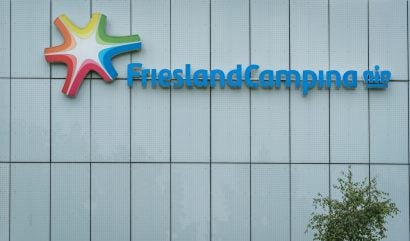
FrieslandCampina slipped to a net loss last year amid what the Dutch dairy cooperative said were “challenging market conditions”.
The company reported a net loss of €149m ($151.1m), compared to a profit of €292m in 2022. Revenue also fell, dropping 7.1% to €13.1bn, while operating profit slid 84.1% to €75m.

Discover B2B Marketing That Performs
Combine business intelligence and editorial excellence to reach engaged professionals across 36 leading media platforms.
Last June, the company installed a new CEO, Jan Derck van Karnebeek. Van Karnebeek succeeded Hein Schumacher, who became CEO of Unilever.
The new CEO launched the Expedition 2030 strategy last October, while he reorganised FrieslandCampina’s business structure, effective from 1 January. Job cuts were also announced before Christmas with a view to realising up to €500m in cost savings from 2026.
In a results filing, the co-op said 2023 was characterised by “difficult market conditions”, replete with “one-off restructuring costs”.
The commentary read: “Business results, particularly with respect to our global consumer dairy and trading activities, were severely under pressure. By contrast, the specialised nutrition and ingredients business groups had a good year, although this was insufficient to compensate for the disappointing results of the other two business groups.
“The disappointing operating profit, combined with one-off costs and higher financing charges, resulted in a negative net result for 2023.”

US Tariffs are shifting - will you react or anticipate?
Don’t let policy changes catch you off guard. Stay proactive with real-time data and expert analysis.
By GlobalDataVan Karnebeek outlined some of the challenges in FrieslandCampina's annual report, including input-cost pressures and a preference for private label over branded dairy products.
“Our result to a large extent depends on commodity dairy prices. In the case of cheese and butter, a large part of our member milk is processed into these products. In a year with high milk purchase costs and low market selling prices, you are, by definition, facing a headwind,” he said.
Consumers “changed their spending patterns”, the CEO said, adding: “In the Western world, consumers spend less on branded products. They increasingly opted for cheaper private labels, which meant lower margins for us.
“In countries such as Pakistan, Indonesia and Nigeria, consumers had to carefully assess whether they could still afford quality dairy products”
In an effort to “improve business performance”, van Karnebeek rolled out Expedition 2030, reorganising FrieslandCampina into seven business groups led by separate executive teams.
At its core are efforts to improve profit margins, boost the co-op’s cash position through cost savings and ‘winning in the market’.
“The company’s profitability is under pressure,” van Karnebeek said. “Therefore, in the coming period, we will take the necessary steps to improve profitability.”
In December, FrieslandCampina revealed it was planning to cut more than 1,800 jobs over the next two years. The Milner cheese brand owner said the cuts would take in its operations around the world and affect all parts of the organisation.





